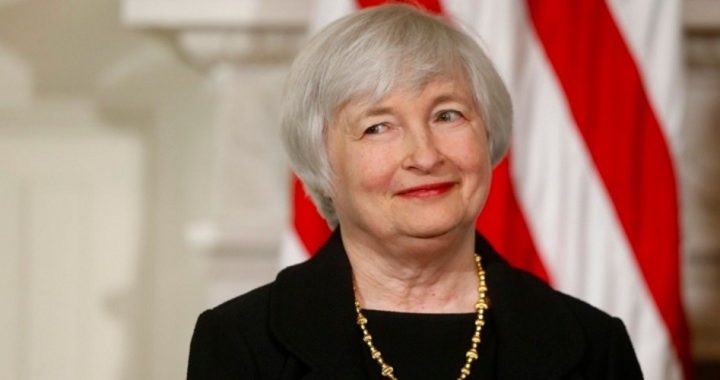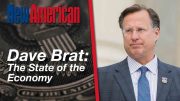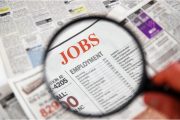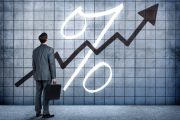
When Barack Obama nominated Janet Yellen (shown) to succeed Ben Berananke as head of the Federal Reserve, the markets heaved a collective sigh of relief, secure in the knowledge that, for now at least, the printing party will continue.
Dr. Yellen, who holds a PhD in economics from Yale, is no stranger to policymaking at the Fed, having served as a member of the Federal Reserve’s Board of Governors from 1994 to 1997, and as President and Chief Executive Officer of the Federal Reserve Bank of San Francisco from 2004 to 2010. Yellen’s additional credentials are impressive, too. She has taught economics at Harvard, Berkeley, and the London School of Economics, and was chair of President Bill Clinton’s Council of Economic Advisors from 1997 to 1999. She is also a member of the globalist-minded Council on Foreign Relations. Her husband, George Akerlof, is a Nobel laureate and economist at Berkeley. If, as appears likely, her nomination is confirmed by the Senate, Yellen will become the first woman to lead the Fed in its 100-year history.
But Washington and Wall Street insiders are cheering the Yellen nomination less for her credentials than for her monetary ideology. In Wall Street jargon, Yellen is considered a “dove,” i.e., someone allegedly more concerned with unemployment than with inflation (as opposed to a “hawk,” for whom inflation is the paramount concern). As she made abundantly clear in a speech at a conference on transatlantic prosperity last February, Yellen’s focus is on employment, and she is frustrated that, in contrast to other recessions in recent history, employment has rebounded at a significantly lower pace following the Great Recession. Accordingly, Yellen has been a staunch supporter of Bernanke’s years-long policy of “quantitative easing,” and appears willing to keep the money spigots open for as long as it takes to stimulate the moribund American economy back to robust jobs creation. In addition, she has been lauded for being one of the only Establishment figures to correctly forecast the housing crash, having anticipated it more than a year in advance.
Such, at least, is the official narrative in the mainstream financial media. And for politicians on Capitol Hill with little or no understanding of how the Federal Reserve system actually works, and anxious to please their suffering constituencies, Yellen’s experience, credentials, and emphasis on employment seem like a perfect fit. But Yellen’s appeal to the political and financial Establishment in Washington and on Wall Street — who assuredly do understand how the Fed works, and how to use it to their personal advantage — is rather less altruistic. They want someone who will continue the easy money policies of “Helicopter Ben” Bernanke, whose willingness to abandon all fiscal restraint and create literally trillions of new dollars, ostensibly to stimulate the economy, has enriched the few at the expense of the many like no financial policy ever before in all of human history.
Because the Federal Reserve System relies upon certain privileged commercial and investment banks to inject new dollars into the money supply, those few who control the assets whose valuation depends crucially on the amount of money available to purchase them en masse stand to make enormous profits. Simply put, when the Fed issues new money, an investment bank like Goldman Sachs has privileged access to it before the man on the street. It uses the money to purchase massive amounts of stocks, bonds, commodities, and other assets, causing spectacular run-ups in stock values. The rest of the economy, meanwhile, continues to stagnate, since the funny money stays under the control of the titans of finance who own the lion’s share of such assets, or is simply absorbed into the banks’ balance sheets. This is the reason the super-rich and the political insiders on their payroll love the current economy and anyone who will keep the party rolling — and why they’re terrified of anyone who might be inclined to rein in the monetary insanity after Bernanke hits the lecture circuit.
Of course, the party can’t go on forever. Even Janet Yellen seems inclined to “ease off on QE” once unemployment drops below the magic level of six percent. The near-zero interest rates that the Fed has employed as one of its tools to promote demand for its easy money cannot remain so forever; after all, lending institutions have little incentive to loan money with such dismal prospects for return, and people have little incentive to save under such conditions. Once interest rates are raised and the money spigots turned down, the markets will crash, as overvalued assets return to some semblance of rational pricing.
The entire premise of modern central banking is morally and economically flawed. It assumes that a free-market economy in goods and services can go hand-in-hand with a command economy overseeing the money supply. In point of fact, in true laissez-faire capitalism (which no longer exists in the United States or anywhere in the West), the markets would set the value and the supply of money relative to other goods and services. Money is, after all, a market commodity, and, left to its own devices, a free market always selects for sound money (i.e., a currency, like gold or silver, whose supply cannot be manipulated by governments or bankers).
No matter what the policies embraced by the head of any inflationary bank like the Federal Reserve, the long-term consequences will always be currency devaluation and the enriching of the few at the expense of the many. No matter what the philosophical preferences of its chairman — employment, inflation, interest rates, or whatever — no council of the wise can possibly know better than the market itself what the optimal money supply is. As a result, policy decisions by America’s central bankers are always political, never economical, and will always benefit some at the expense of others, distorting prices, producing asset bubbles, and, sooner or later, triggering crashes and recessions.
The very notion of “inflation” is deceptive, since it has come to be associated in the popular mind with rising prices. But the late Hans Sennholz, in his marvelously well-written book Inflation, defined “inflation” as the phenomenon of distorting the money supply by printing money, regardless of whether the particular circumstances led to rising or falling prices (so-called “deflation”). By such a definition, all policymakers at the Fed, regardless of their preference for “easy” or “tight” money are ipso facto inflationists, because all of them believe in the manipulation of the money supply to achieve political ends, and none of them champion laissez-faire money markets.
Thus Janet Yellen, despite her perspicacity in predicting the housing crash (and here, we must note, her foresight, while exceeding that of her fellow establishmentarians, suffers by comparison with the likes of Peter Schiff and Ron Paul, who were mocked years in advance of the 2008 meltdown for sounding the alarm), is nonetheless a staunch inflationist and establishmentarian who, like Bernanke, Greenspan, Volcker, and all of her other predecessors at the Fed, will use her power to ensure the continued ascendancy of the “money trust,” to the long-lasting detriment of America’s dwindling middle class.
Photo of Janet Yellen: AP Images



